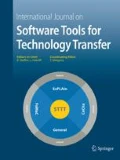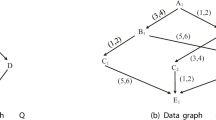Abstract
Many business processes are modeled as workflows, which often need to comply with business rules, legal requirements, and authorization policies. Workflow satisfiability is the problem of determining whether there exists a workflow instance that realizes the workflow specification while simultaneously complying with such constraints. This problem has already been studied by the computer security community, with the development of algorithms and the study of their worst-case complexity. These solutions are often tailored to a particular workflow model and are, therefore, of little or no use in analyzing different models; their worst-case complexities are likely to be an unreliable judge of their feasibility; and they lack support for other forms of analysis such as the determination of the smallest number of users required to satisfy a workflow specification. We propose model checking of an NP-complete fragment \(\mathsf{LTL }(\mathsf{F })\) of propositional linear-time temporal logic as an alternative solution. We report encodings in LTL(F) that can compute a set of solutions (thus deciding satisfiability), compute minimal user bases and a safe bound on the resiliency of satisfiability under the removal of users. These theoretical contributions are validated through detailed experiments whose results attest to the viability of our proposed approach.












Similar content being viewed by others
Notes
Constraint density is the term we will use for the ratio of the number of constraints in the workflow to the total number of possible constraints.
An order ideal \(I \subseteq X\) in a partially ordered set \((X,\leqslant )\) has the property that if \(x \in I\) and \(y \le x\), then \(y \in I\). A set \(F\subseteq X\) is an order filter if its complement \(X\setminus F\) is an order ideal.
References
Ball, T., Podelski, A., Rajamani, Sk: Boolean and Cartesian abstraction for model checking C programs. STTT 5(1), 49–58 (2003)
Bertino, E., Ferrari, E., Atluri, V.: The specification and enforcement of authorization constraints in workflow management systems. ACM Trans. Inf. Syst. Secur. 2(1), 65–104 (1999)
Bogudlov, I., Lev-Ami, T., Reps, T., Sagiv, M.: Revamping TVLA: making parametric shape analysis competitive. In: Proceedings of the 19th International Conference on Computer Aided Verification, pp. 221–225. Springer, Berlin (2007)
Cimatti, A., Clarke, E.M., Giunchiglia, E., Giunchiglia, F., Pistore, M., Roveri, M., Sebastiani, R., Tacchella, A.: NuSMV 2: an opensource tool for symbolic model checking. In: CAV, pp. 359–364 (2002)
Crampton, J.: A reference monitor for workflow systems with constrained task execution. In: Proceedings of the 10th ACM Symposium on Access Control Models and Technologies, pp. 38–47 (2005)
Crampton, J., Khambhammettu, H.: Delegation and satisfiability in workflow systems. In: Ray, I., Li, N. (eds.) Proceedings of 13th ACM Symposium on Access Control Models and Technologies, pp. 31–40 (2008)
Crampton, J., Huth, M.: On the modeling and verification of security-aware and process-aware information systems. In: van der Aalst, W., Accorsi, R. (eds.) Proceedings of BPM Workshop on Workflow Security Audit and Certification. Lecture Notes in Business Information Processing, Clermont-Ferrand, France, August 2011, vol. 100, pp. 423–434. Springer, Berlin (2012)
Crampton, J., Huth, M.: Synthesizing and verifying plans for constrained workflows: transferring tools from formal methods. In: Bensalem, S., Havelund, K. (eds.) Proceedings of International Workshop on Verification and Validation of Planning and Scheduling Systems, Freiburg, Germany, June 2011
Hildebrandt, T.T., Mukkamala, R.R.: Declarative event-based workflow as distributed dynamic condition response graphs. In: PLACES, pp. 59 (2010)
Rozier, K.Y., Vardi, M.Y.: LTL satisfiability checking. STTT 12(2), 123–137 (2010)
Rozier, K.Y., Vardi, M.Y.: A multi-encoding approach for LTL symbolic satisfiability checking. In: Formal Methods, pp. 417–431 (2011)
Russell, N.C.: Foundations of Process-Aware Information Systems. PhD thesis, Faculty of Information Technology, Queensland University of Technology (2007)
Sandhu, R., Coyne, E.J., Feinstein, H., Youman, C.E.: Role-based access control models. IEEE Comput. 29(2), 38–47 (1996)
Schmidt, D.A., Steffen, B.: Program analysis is model checking of abstract interpretations. In: Proceedings of 5th International Symposium on Static Analysis, pp. 351–380 (1998)
Sistla, A.P., Clarke, E.M.: The complexity of propositional linear temporal logics. J. ACM 32, 733–749 (1985)
Tan, K., Crampton, J., Gunter, C.: The consistency of task-based authorization constraints in workflow systems. In: Proceedings of 17th IEEE Computer Security Foundations Workshop, pp. 155–169 (2004)
van der Aalst, W.M.P., Pesic, M., Schonenberg, H.: Declarative workflows: balancing between flexibility and support. Comput. Sci. R &D 23(2), 99–113 (2009)
van der Aalst, W.M.P., ter Hofstede, A.H.M., Kiepuszewski, B., Barros, A.P.: Workflow patterns. Distrib. Parallel Databases 14(1), 5–51 (2003)
Vardi, M.Y., Wolper, P.: Reasoning about infinite computations. Inf. Comput. 115, 1–37 (1994)
Wang, Q., Li, N.: Satisfiability and resiliency in workflow systems. In: Proceedings of 12th European Symposium on Research in Computer Security, pp. 90–105 (2007)
Warner, J., Atluri, V.: Inter-instance authorization constraints for secure workflow management. In: Proceedings of the 11th ACM Symposium on Access Control Models and Technologies, pp. 190–199 (2006)
Westergaard, M.: Better algorithms for analyzing and enacting declarative workflow languages using LTL. In: BPM, pp. 83–98 (2011)
Winskel, G.: Event structures. In: Advances in Petri Nets, pp. 325–392 (1986)
Author information
Authors and Affiliations
Corresponding author
Rights and permissions
About this article
Cite this article
Crampton, J., Huth, M. & Kuo, J.HP. Authorized workflow schemas: deciding realizability through \(\mathsf{LTL }(\mathsf{F })\) model checking. Int J Softw Tools Technol Transfer 16, 31–48 (2014). https://doi.org/10.1007/s10009-012-0269-3
Published:
Issue Date:
DOI: https://doi.org/10.1007/s10009-012-0269-3




